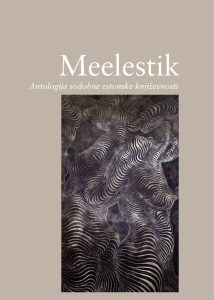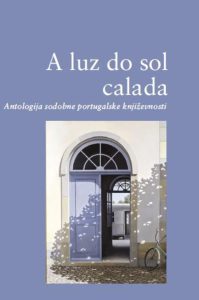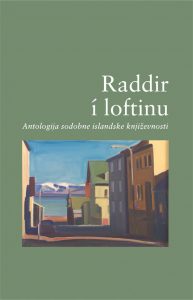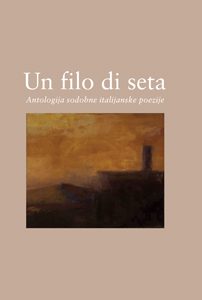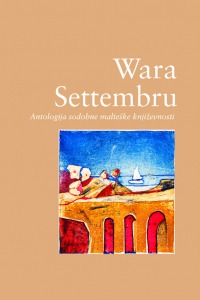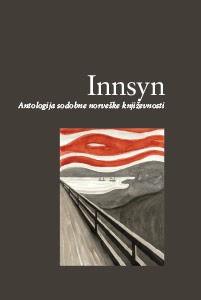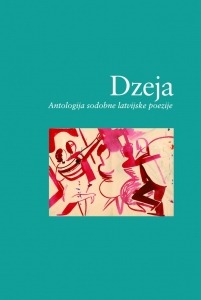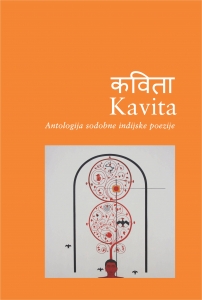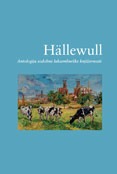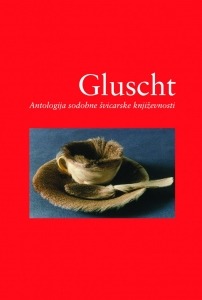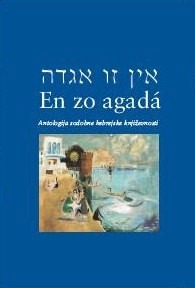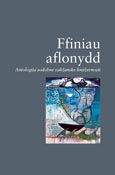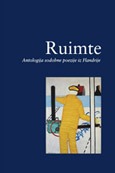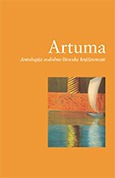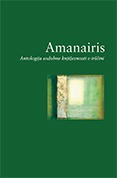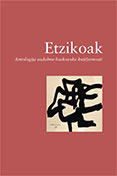Vilenica Anthologies
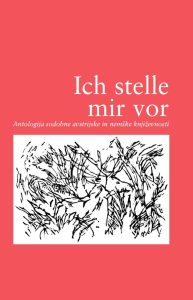
On the cover: Christian Thanhäuser: Woodcut Traum, woodcut, 2023
Ich stelle mir vor. Anthology of contemporary Austrian and German literature
The Vilenica Anthologies, Slovene Writers’ Association, 2023
Selected and edited by: Ludwig Hartinger, Amalija Maček in Andreas Unterweger
Authors: Anna Baar, Marcel Beyer, Philipp Böhm, Yevgeniy Breyger, Ann Cotten, Michael Donhauser, Valerie Fritsch, Reinhard Kaiser-Mühlecker, Esther Kinsky, Ursula Krechel, Elke Laznia, Teresa Präauer, Kerstin Preiwuß, Silke Scheuermann, Max Sessner, Clemens J. Setz, Thomas Stangl, Andreas Unterweger, Levin Westermann
Translated by: Brane Čop, Ana Grmek, Zdenka Hafner-Čelan, Seta Knop, Mojca Kranjc, Amalija Maček, Anja Naglič, Tanja Petrič, Irena Smodiš, Urban Šrimpf, Aleš Šteger, Aleš Učakar, Štefan Vevar
The book will be published with the support of the Slovenian Book Agency, the Goethe-Institut Ljubljana and the Austrian Cultural Forum. The book was partly created within the framework of the Intercultural Literary Studies research program (P6-0265), which is financed by the ARRS from the government budget.
The Anthology of contemporary Austrian and German literature
By Amalija Maček, Slovenian co-editor of the anthology
[show_more more=”Show more” less=”Show less” color=”#0066CC” list=”»”]
The year 2023 will be marked by Slovenia’s appearance as Guest of Honor of the Frankfurt Book Fair, the largest book fair of its kind in the world. The guest country will be a focal point of coverage by more than 6000 journalists, and that country’s appearance is intended to promote it in a comprehensive way in the fields of literature, art, tourism and cuisine, as well as sport. Slovenia will be represented by a number of exhibitions, concerts, literary and professional events, the main venue being the Slovenian pavilion at the Fair. The pavilion is designed by Slovenian architects and will feature translations of Slovenian books into foreign languages from the last three years. Preparations for the Fair have been underway for several years and include, among other things, subsidies for translations, training for publishers and translators – the aim being to strengthen the long-term visibility of Slovenian authors both in the German-speaking world as well as globally. The number of Slovenian translations into foreign languages has increased by almost 100% since 2013. The presence of Slovenian authors in the German-speaking world has been particularly strengthened, both through translations and readings at important festivals and cultural institutions – take, for example, Anna Marwan, Nataša Kramberger, Anja Zag Golob, Aleš Šteger, and Goran Vojnović, who are already recognized authors in Germany.
The Frankfurt Book Fair is no longer simply a business fair. It is increasingly becoming a fair for meeting and getting to know each other, which is why those in charge have been emphasizing the importance of intercultural exchange in both directions since the signing of the agreement. Every year in March and August, Slovenian Book Agency hosts important German journalists and organisers of literary events. At the beginning of June, the German Academy of Language and Literature, from Darmstadt – which also awards the highest literary prize in the German-speaking world, the Büchner Prize – held its first meeting in Slovenia. Its members include the most prominent German authors, who visited Ljubljana on this occasion to present their works and to celebrate the publication of a major anthology of Slovenian poetry in German translation. The anthology has just been published by the renowned Hanser publishing house in cooperation with the Darmstadt Academy under the title “Mein Nachbar auf der Wolke” (ed. by Matthias Göritz, Amalija Maček, and Aleš Šteger).
Historically, German and Austrian literature have followed quite different paths, but today they are closely linked due to the frequent migration of authors within the linguistic area and the tendency of the leading Austrian authors to publish their works with German publishers. Historically, the German language, and therefore literature, was not welcome in Yugoslavia, and few books by German and Austrian authors found a place in the most prestigious literary collections of the time. Here we can perhaps mention the translations of Thomas Mann’s The Magic Mountain (Janez Gradišnik, 1956), Robert Musil’s The Man Without Qualities (Janez Gradišnik, 1962), and Ingeborg Bachmann’s Malina (Anja Uršič, 1983). After 1991, the number of translations from German increased exponentially, probably mainly due to Slovenia’s turning towards the German-speaking area as an ally and a model (for example, in the field of law). Geographical proximity, a common past, and a somewhat similar mentality, but above all the increasing support for publishers to translate and publish the works of German authors, all contributed to the increase of the number of books. Also, perhaps to some extent, the changes in how these authors wrote were of interest to us, since after the reunification of the two Germanies they often dealt with themes of transition. On the other hand, like Slovenian authors, they were inspired by American literature.
German and Austrian literature today are cosmopolitan, open to external influences and internal diversity, while still retaining some of the specificities of their respective places and literary traditions. That is why we have chosen them as the focus of this year’s Vilenica Festival, where we will host important German authors, literary mediators, and publish a special anthology of German-speaking authors. The texts were chosen by Andreas Unterweger, Ludwig Hartinger, and Amalija Maček, who wanted to present a varied selection of lesser-known names with most interesting and innovative writing, as well as to showcase some of the highly acclaimed and award-winning authors in Germany who, surprisingly, have not yet been translated into Slovenian. They deserve to be. One such author is Büchner Prize winner Clemens Setz; another is Esther Kinsky, an author living and writing in Friuli. The Austrian authors Anna Baar and Valerie Fritsch are also close to us, both geography- and mentality-wise. The selection of texts is translated into Slovenian by renowned translators, including Seta Knop, Mojca Kranjc, Anja Naglič, Štefan Vevar, and others.
[/show_more]
Meelestik. An anthology of contemporary Estonian literature
The Vilenica Anthologies, Slovene Writers’ Association, 2022
Selected and edited by:Kätlin Kaldmaa and Julija Potrč Šavli
Authors: Kai Aareleid, Meelis Friedenthal, Andrei Ivanov, Hanneleele Kaldmaa, Kätlin Kaldmaa, Maarja Kangro, Andrus Kivirähk, Veronika Kivisilla, Igor Kotjuh, Hasso Krull, Kalju Kruusa, Margit Lõhmus, Triin Paja, Maarja Pärtna, Rein Raud, Kaur Riismaa, Triin Soomets, Ave Taavet, Urmas Vadi, Elo Viiding, Tõnis Vilu
Translated by: Lijana Dejak, Matej Goršič, Ana Pepelnik, Andrej Pleterski, Julija Potrč Šavli, Sara Špelec
The book will be published with the support of the Slovenian Book Agency and the Cultural Endowment of Estonia.
From the foreword to the anthology
By Julija Potrč Šavli, Slovenian co-editor of the anthology
[show_more more=”Show more” less=”Show less” color=”#0066CC” list=”»”]
Vaata, kõik on teised – See, everyone is someone else
Estonian literature has thus far been relatively unknown in Slovenia. I would dare to say that this fact cannot be attributed to Slovenes’ lack of interest in literature from this Baltic nation, and the reason for its being unknown lies even less in the fact that Estonian literature would have nothing to offer us. The main reason for the very small number of Estonian translations in Slovenia is quite simple and logical: the lack of translators and literary intermediaries from Estonian. Especially when it comes to the literature of smaller nations, translators are often the key link between language communities. They suggest works by authors from foreign languages to Slovenian publishers and, of course, see to translations. So far, we have seen translations of Estonian poets who have performed at the Vilenica Festival and the Days of Poetry and Wine (Jaan Kaplinski, who passed away in 2021 and was nominated for the Nobel Prize in Literature, was the only Estonian to receive the Vilenica Grand Prize, in 2001); since 2018, several children’s and youth works which testify to the quality of Estonian youth literature have been published in direct translation by the author of this foreword; in 2020, the poetry collection Love Is by the Estonian co-editor of this anthology, Kätlin Kaldmaa, was published (an excellent translation from English was done by Bojana Vajt). So there are many important Estonian literary names who are still waiting to be translated into Slovene, the first of which is probably Jaan Kross (1920–2007), who is, with translations into twenty-six languages, the most translated Estonian author. His best-known novels are The Czar’s Madman (1978) and Between Three Plagues (published in four parts between 1970 and 1980); the first one in particular is an allegorical masterpiece in which Kross presents a critique of the Soviet regime through a historical framework.
The present anthology thus fills an important gap and represents a sampling from the lively contemporary literary scene in Estonia in the field of poetry and prose. It brings together twenty-one literary voices – eleven poets and ten prose writers; the oldest born in 1961 and the youngest in 1992. These are mostly new names that are being presented in Slovenia for the first time. Only a few have already visited Slovenia, such as poets Triin Soomets and Hasso Krull at the Vilenica Festival and Maar Kangro at the Days of Poetry and Wine (however, in this anthology we get to know Kangro as an author of short prose), while Andrus Kivirähk has two translations of youth literature in Slovene and appears here for the first time with adult prose.
How to describe contemporary Estonian literature? What common denominator is there to define it? This question is not an easy one to answer and it might seem quite pointless to look for an answer. As with any national literature, Estonian literature’s greatest richness lies in its diversity, and this is exactly what the present anthology brings. From Andrus Kivirähk’s story about Pinocchio falling in love with the statue of the Virgin Mary, to Ave Taavet’s story about a museum visitor who becomes an exhibit in the same institution, as well as excellent poetry from many voices – Estonian authors are alive, sparkling, and above all, diverse. Although Estonians are linguistically and culturally closest to their Finnish neighbours (Estonian, like Finnish, is a Finno-Ugric language, but the two are not similar enough for their speakers to be able to converse), it would be in vain to expect to find Paasilinna-like quirky characters in their literature, which in Slovenia we often equate with Finnish literature.
Culturally and linguistically, Finns and Estonians might be close, but the history of the two countries was significantly different, as Estonia was part of the Soviet Union from World War II to 1991. During this time, there were mass deportations of Estonians to Siberia and other parts of the Soviet Union, and resettlements also took place in another direction: Russian-speaking citizens were relocated to Estonia. There are still about 300,000 Russian-speaking people in this country which has a total population of just over 1.3 million. The Russian community is large and has a special status in Estonia, but mostly lives in the east of the country, where Estonian is almost non-existent in some cities (e.g., in Narva). In this anthology, Russian-speaking Estonian authors are represented by the poet Igor Kotjuh and the writer Andrej Ivanov.
Besides Tallinn, the city of Tartu is an important academic centre, where the university was founded in the 17th century and still remains the largest and most prestigious university in the country. Tartu is a city with a lively cultural scene: just like Ljubljana, it holds the title of UNESCO City of Literature, it hosts several literary festivals, the Karl Ristikivi Writers’ Residence (where the first resident was Slovenian author Andrej Tomažin, in 2017), several literary magazines are being published there, for example Värska Rõhk, an important magazine for young authors, and in 2024, Tartu will also become the European Capital of Culture.
Let me conclude on an entirely personal note. Discovering new Estonian literary voices was a true revelation for me: such a small country and yet so many great authors! As a long-time translator from Finnish, I noticed some time ago that no one is actively translating Estonian literature, but I was convinced that their literature hides many treasures worth discovering, so I started learning the language. Somewhat naively, I expected to learn it almost overnight due to its resemblance to Finnish, but I soon found out that the two languages are still quite different and that the task would not be as easy as I initially thought.
But it was worth persisting – the present anthology is proof of that. I would like to thank the Estonian co-editor Kätlin Kaldmaa, with whom I made a selection of author and who brought my attention to many authors I did not know before. Thanks are also due, of course, to the Vilenica Festival, the Slovene Writers’ Association and all those who made this anthology possible, and especially to the translators Matej Goršič, who also translated directly from Estonian, Ana Pepelnik and Andrej Pleterski, who translated from English, as well as Lijana Dejak and Sara Špelec, who translated Kotjuh and Ivanov from Russian. Together we present previously unknown Estonian literary treasures. Let them enchant you as they enchanted me. Finally, I invite you to read the Anthology of Contemporary Estonian Literature with the concluding verses from a poem by Triin Soomets:
how to remain myself
I asked someone else
it is not possible, he told me
see, everyone is someone else
[/show_more]
A luz do sol calada. An anthology of contemporary Portuguese literature
The Vilenica Anthologies, Slovene Writers’ Association, 2021
Selected and edited by: Aljaž Koprivnikar and Ricardo Marques
Authors: Bruno Vieira Amaral, Golgona Anghel, Mário de Carvalho, Hélia Correia, Mafalda Ivo Cruz, Raquel Nobre Guerra, Fernando Guimarães, Lídia Jorge, Nuno Júdice, Sandro William Junqueira, Filipa Leal, Adília Lopes, Fátima Maldonado, Miguel Martins, Ricardo Tiago Moura, Ana Teresa Pereira, Helder Moura Pereira, Alberto Pimenta, Álvaro Seiça, Teresa Veiga and Rui Zink
Translated by: Barbara Juršič, Mojca Medvedšek, Blažka Müller, Mateja Rozman and Katja Zakrajšek
The book will be published with the support of the Slovenian Book Agency, Camões Institute – Camões Instituto da Cooperação e da Língua, I. P., the Ministry of Foreign Affairs of the Republic of Portugal and the General Directorate for Book, Archives and Libraries – Direção-Geral do Livro, dos Arquivos e das Bibliotecas (DGLAB).
[show_more more=”Show more” less=”Show less” color=”#0066CC” list=”»”]
A luz do sol calada. An anthology of contemporary Portuguese literature, will bring special attention to the literature of Portugal, about which co-editor Ricardo Marques said:
Portugal is still a metatextual land that likes to think about herself, that thinks about herself in literature that is created somewhere over there, at the seaside or on the top of the mountains, in the city, on the islands or by river estuaries, but has almost always had its back turned to Spain. It seems that the eternal atmosphere of competition that had been entrenched in the Iberian Peninsula for so many centuries somewhat diminished towards the end of the millennium, symbolically overcoming matters through their both joining the European Union (then the European Economic Area) thirty-five years ago, in 1986. It seems that the new millennium has brought new challenges, and other threatening dangers and influences brought by cultural rapprochement and globalisation facilitated by the Internet. Therefore, I am not convinced that the words of the Spanish thinker and aficionado of Portugal, Miguel de Unamuno, still apply to the average Portuguese writer, as they did at the beginning of the 20th century: “The Portuguese are a sad people even when they smile. The literature of these people, even when comical and satirical, is sad literature. Portugal is a people of suicides, a suicidal people. Life has no transcendent sense for them. They may want to live, yes; but for what? Better not to live.”
Excerpt from the foreword to the anthology
By Aljaž Koprivnikar, Slovenian co-editor of the anthology
In the large family of national literatures (in so far as ‘national literature’ is still an applicable concept), Portuguese literature stands on the edge of the European continent and is often far removed from the thoughts of many Slovenian readers, with the exception of those giants of Portuguese and world literature, such as Luís de Camões, Fernando Pessoa and Nobel laureate José Saramago. Yet Portuguese literature boasts a great power built through centuries and it has become part of one of the most diverse European literary currents, with outstanding writers, whose works – 21 for the 21st century – have been selected for this year’s Vilenica anthology.
The selection, which is a dynamic combination of styles and genres, was done by myself, the Slovenian editor, and my co-editor Ricardo Marques, a Portuguese poet, doctor of Portuguese literature and a great friend of Slovenian culture. We sought to present to the Slovenian reader the freshest voices of Portuguese literature, voices who have also been the driving forces of literary development and writing in Portugal in the last few decades. While compiling the anthology, we came to recognise many similarities between Slovenian and Portuguese literature and culture: both societies perceive themselves as a people of writers and poets, sometimes feeling minor or even limited in the European canon, despite producing fresh and powerful literature. Common specific traits of both peoples should not be overlooked, for example almost flawless pronunciation of Slovenian palato-alveolar fricatives and affricates by our Portuguese friends, the indirect connection of Central European melancholy and the Portuguese saudade (although the latter includes the meaning of longing to a greater extent), considerable similarities between the Slovenian figure of kurent and careto, coffee culture, diversity in wines, and a focus on the exterior, on the sea, which has somewhat different connotations with the Portuguese than with Slovenians. Similarities and differences always enrich both sides, with duality (or perhaps dual with us) being typical of the Portuguese culture and soul that is metaphorically split between tradition and contemporaneity.
In Portugal, where they are somewhat set on the past or the remnants of tradition that capitalism buried here a long time ago, the three Fs of Portugal – fado, football, Fatima – have not applied for a while – although, admittedly, they should not be ignored in some cases. The country and its culture have opened wide to the outside world and the world within, deepening a fresh yet culturally recognisable Portuguese character. (With approximately 215 to 220 million native speakers and 50 million L2 speakers, Portuguese has approximately 270 million total speakers. It is usually listed as the sixth-most spoken language andthe third-most spoken European language in the world in terms of native speakers.) Portuguese is the third-most spoken mother tongue in Europe, while literature in Portuguese, including in the former colonies, has been a significant intermediary between different cultures and literary trends. This affiliation is nicely reflected on the cover of the anthology, the work of Portuguese artist Manuel Amad: his painting A porta da estação (Station door, 1986) takes the readers through the doors among the lines and verses making up contemporary Portuguese literature. I am inviting you to step in through these excellent Slovenian translations, and delve into a selection of contemporary Portuguese literature and let go at the crossroads of the winds, of extremes, the openness of the ocean on the one side and the inwardness of the old Continent on the other, which offer every necessary insight into the faraway and perhaps into the unknown.
[/show_more]
Raddir í loftinu. Anthology of Contemporary Icelandic Literature
The Vilenica Anthologies, Slovene Writers’ Association, 2020
Authors: Kristín Marja Baldursdóttir, Gyrðir Elíasson, Þórdís Gísladóttir, Jónas Reynir Gunnarsson, Hallgrímur Helgason, Dagur Hjartarson, Fríða Ísberg, Auður Jónsdóttir, Hildur Knútsdóttir, Andri Snær Magnason, Guðrún Eva Mínervudóttir, Sverrir Norland, Eiríkur Örn Norðdahl, Auður Ava Ólafsdóttir, Bragi Ólafsson, Ragnar Helgi Ólafsson, Kristín Ómarsdóttir, Sigurður Pálsson, Ragna Sigurðardóttir, Sigurjón Birgir Sigurðsson, Bergþóra Snæbjörnsdóttir.
Translations: Miljana Cunta, Miriam Drev, Iva Klemenčič, Ana Pepelnik, Andrej Pleterski, Lucija Stupica.
Editors: Sverrir Norland and Lucija Stupica
This anthology is published with the support of the Slovenian Book Agency, the Icelandic Literature Center – Miðstöð íslenskra bókmennta and the European Commission.
[show_more more=”Show more” less=”Show less” color=”#0066CC” list=”»”]
The 2020 festival focused on Icelandic literature by publishing the Raddir í loftinu, an anthology of Icelandic literature. Co-editor Sverrir Norland introduced it as follows:
“Recently, I came upon a wonderful Icelandic word, sorgarfegurð, which describes writers’ difficult position very well. Like German (Icelandic is a Germanic language), Icelandic can create new words by merging existing ones. Sorgarfegurð is a composite of sadness and beauty. I think it is very close in meaning to the Portuguese word saudade, but is even more precise as it refers to yearning something that will never return. Icelanders think that the world is constantly disappearing before our eyes. Our culture is a very good example: it seems it is taking its last breaths every day. Every day when we wake up, we first start reviving the language by writing and speaking it. Writing in Icelandic is not limited to new stories and articles about bringing down capitalist pigs; it literally means breathing life into words every time we use them. We inspire language just like trees and phytoplankton inspire us. The word for inspiration in Icelandic is innblástur. In Latin, this means ‘to breathe in life’. If I or someone else who can also speak these ancient fragile words do not do it no-one will. […] I am very happy that I can introduce several good friends and allies of mine. Writers are voices in the air. To exist, they need someone to listen. I am happy that we have brought several of our literary voices to Slovenia, among another nation with a small population, which, however, is not built from lava, the endless ocean and nyorka but beautiful forest, wolves and – I assume – similar sadness we grow up with. I think you will understand our sorgarfegurð.”
[/show_more]
Un filo di seta. Anthology of contemporary Italian poetry
The Vilenica Anthologies, Slovene Writers’ Association, 2019.
Authors: Antonella Anedda, Nanni Balestrini, Silvia Brè, Franco Buffoni, Maria Grazia Calandrone, Giuseppe Conte, Maurizio Cucchi, Claudio Damiani, Milo De Angelis, Paolo Febbraro, Umberto Fiori, Biancamaria Frabotta, Vivian Lamarque, Valerio Magrelli, Guido Mazzoni, Laura Pugno, Fabio Pusterla, Antonio Riccardi, Mario Santagostini, Gian Mario Villalta
Editors: Franco Buffoni and Veronika Simoniti
Translations: Miljana Cunta, Nadja Dobnik, Alenka Jovanovski, Marko Kravos, Gašper Malej, Veronika Simoniti
[show_more more=”Show more” less=”Show less” color=”#0066CC” list=”»”]
This anthology is published with the support of the Slovenian Book Agency, the Istituto Italiano di Cultura in Slovenia–The Institute for Italian Culture in Slovenia (as part of the “Vivera ALL’Italiana” initiative of the Italian Ministry of Foreign Affairs and International Cooperation), and the European Commission.[/show_more]
Antologije Vilenice Series, Slovene Writers’ Association, 2018
Authors: Walid Nabhan, Simone Galea, Immanuel Mifsud, Simon Bartolo, Adrian Grima, Simone Inguanez, Loranne Vella, Alex Vella Gera, Abigail Ardelle Zammit, Ġużè Stagno, Claudia Gauci, Nadia Mifsud, Clare Azzopardi, John Aquilina, Antoine Cassar, Glen Calleja, Karl Schembri, Norbert Bugeja, Miriam Calleja, Leanne Ellul.
Editors: Immanuel Mifsud and Peter Semolič.
Translators: Breda Biščak, Miljana Cunta, Miriam Drev, Nada Grošelj, Boris Jukić, Ana Pepelnik, Andrej Pleterski, Vera Pejovič, Peter Semolič.
The Anthology has been funded with the support from Slovenian Book Agency.
[show_more more=”Show more” less=”Show less” color=”#0066CC” list=”»”]
With publishing of the anthology and guest authors, special attention of the 33rd Vilenica will be brought to Maltese literature, which is still rather unknown in Slovene literary space. The anthology of contemporary Maltese literature under the title Wara Settembru presents 20 authors who have put the Maltese literature on the literary map of the world; world-renowned literary names can be found in the anthology, as are the recipients of the The European Union Prize for Literature Immanuel Mifsud and Walid Nabhan. On the occasion of the publishing of the anthology, the festival will host the awarded author Clare Azzopardi who writes both for children and adults, writer, translator and performer Loranne Vella, poet Norbert Bugeja, lecturer of postcolonial studies at the Mediterranean Institute of the University of Malta, as well as Immanuel Misfud, lecturer of literature at the University of Malta who has published many prose and poetry books and has even wrote some original lullabies.[/show_more]
Innsyn. Antology of Contemporary Norwegian Literature
Antologije Vilenice Series, Slovene Writers’ Association, 2017
Authors: Øyvind Berg, Nils Christian, Gro Dahle, Jon Fosse, Inger Elisabeth Hansen, Tone Elisabeth Hødnebø, Cecilie Løveid, Stein Mehren, Steinar Opstad, Endre Ruset, Torgeir Schjerven, Ingrid Storholmen, Gunnar Wærness, Kjell Askildsen, Tomas Espedal, Brit Bildøen, Erika Fatland, Beate Grimsrud, Vigdis Hjorth, Ragnar Hovland, Mette Karlsvik, Karl Ove Knausgård, Gunnhild Øyehaug, Per Petterson, Åsne Sejerstad, Carl Frode Tiller, Ole Robert Sunde, Dag Solstad.
Editors: Birgit Hatlehol and Tanja Petrič.
Translators: Darko Čuden, Nada Grošelj, Iva Klemenčič, Jana Kocjan, Martina Noč, Tanja Petrič and Marija Zlatnar Moe.
The Anthology has been funded with support from NORLA – Norwegian Literature Abroad, Embassy of the Kingdom of Norway and Slovenian Book Agency.[show_more more=”Show more” less=”Show less” color=”#0066CC” list=”»”]
Innsyn – insights into contemporary Norwegian literature
Tanja Petrič, editor of the anthology
The 32nd Vilenica puts front and centre Norwegian literature, which in spite its terrific tradition and the blooming Scandinavian crime fiction genre, alongside the recent success of individual authors such as Ove Knausgård, Per Petterson, Jon Fosse or Maria Parr, in Slovenia still ranks among the lesser-known domains of prose. The anthology of contemporary Norwegian literature entitled Innsyn, which was published within the framework of the festival, brings 28 fresh insights into the Norwegian literary landscape. According to professor Anders Johansen, the latter has in recent years been profoundly affected by the massacre on Utøya Island in July of 2011, which drastically reconfigured the attitude of the Norwegians towards language: “For many of us, it became crucial to find a painstakingly truthful expression for what had transpired, in a language that could do justice to the facts as well as the emotions.”
Selected texts were transmuted to Slovene by Darko Čuden, Nada Grošelj, Iva Klemenčič, Jana Kocjan, Martina Noč, Tanja Petrič and Marija Zlatnar Moe. “The purpose of the anthology is not only to present the literary output of the most visible contemporary Norwegian authors of various genres and generations, but also to show how the Norwegian writers seek out language that comprehensively expresses reality. The value of literature lies in helping us see the world clearly, not because writers are the most mindful of people, but because they try the hardest of all to put what they see into words. Authors of documentary-travelogue literature, such as female writers Åsne Seierstad who describes the massacre on Utøya Island, or Erika Fatland who explores how the Soviet heritage has affected five former republics, refreshed the documentary genre with their striking works. Karl Ove Knausgård, Vigdis Hjorth and Tomas Espedal did not become world-renowned merely for their intricate narration of intimate family stories, but also for persistently delving into the relationships between fiction and reality. Socially engaged poets, such as Inger Elisabeth Hansen and Torgeir Schjerven, teach us, in non-dogmatic ways, how to hearken to climate change, while also tuning our sensibility to the particularities of language. A new trend, with poets like Øyvind Berg, is also to create one’s own poetic language, which in his case leans on Shakespeare and Paul Celan while incorporating slang and entirely idiosyncratic, hybrid expression.” With these words, the selection of the authors is affirmed by the anthology’s co-editor Birgit Hatlehol, among other the head of the Oslo International Poetry Festival and the Oslo Poetry Film Festival.[/show_more]
Dzeja. Anthology of Contemporary Latvian Poetry
Despite its modern qualities, contemporary Latvian poetry is still very much connected to Latvian folk songs, which are said to be “as old as the Latvian language.” This is mostly due to the lack of a history of Latvian poetry, some Latvian scholars claim only half-joking. After the heroic but unsuccessful battles with Order of the Teutonic Knights in the 13th century, Latvians and Estonians were subject to the cruel authority of their German masters for more than six centuries. Circumstances did not improve later when they were subsumed into the Russian Empire. Folk songs (daina), for a long time the only poetic form in Latvia, were passed from generation to generation, mostly by women.[show_more more=”Show more” less=”Show less” color=”#0066CC” list=”»”]
Even today, many nations consider themselves a nation of poets, but, in Latvia’s case, this seems to be especially true. In 1841, the German geographer and traveller J.G. Kohl wrote: “It would be truly difficult in this day and age in Europe to find a nation that deserves to be called a nation of poets more than Latvia does. Likewise, it would be difficult to find a land that is more a land of poetry then Latvia. Every Latvian is born a poet, all write poetry and create songs – which can also be sung.”
Authors in the anthology are Anna Auziņa, Ingmāra Balode, Uldis Bērziņš, Inga Gaile, Justīne Janpaule, Liāna Langa, Artis Ostups, Marts Pujāts, Edvīns Raups, Katrīna Rudzīte, Māris Salējs, Kārlis Vērdiņš, Arvis Viguls, Inese Zandere. The poems were selected and edited by Artis Ostups and Klemen Pisk.
The anthology was published with the assistance of the Slovenian Book Agency and the Latvian Writers Union.[/show_more]
Kavita. Anthology of Contemporary Indian Literature
The festival will see the unveiling of the 10th volume of the Vilenica Anthologies titled Kavita, which means “poetry” in Hindi. The anthology of contemporary Indian poetry features 31 male and female authors.[show_more more=”Show more” less=”Show less” color=”#0066CC” list=”»”]The contributing authors are Sirpi Balasubramaniam, Mangalesh Dabral, Haraprasad Das, Ranajit Das, Hemant Divate, Gnanakoothan, Sankha Ghosh, Adil Jussawalla, Chandrashekhara Kambar, Pravasini Mahakud, Jayanta Mahapatra, Prathibha Nandakumar, Kunwar Narain, Jameela Nishat, Jayant Parmar, Surjit Patar, Nilmani Phookan, Savithri Rajeevan, Ramakanta Rath, Padma Sachdev, K. Satchidanandan, Nabaneeta Dev Sen, Malika Amar Sheikh, Kedarnath Singh, Yumlembam Ibomcha Singh, H. S. Shivaprakash, K. Sivareddy, Arundhathi Subramaniam, Vishwanath Prasad Tiwari, Kamal Vora, and Sitanshu Yashaschandra.
The author responsible for the initial selection of contributing authors, Mr. K. Satchidanandan, a renowned and acclaimed Malayalam-language poet himself, tried to secure a place in the anthology for the best poets, writing in the largest number of languages possible. He focused particularly on quality, relevance, contemporaneity, and on a healthy balance between male and female poets. The cover art of the anthology is painted by the artist B. Balagopalana.
The publication of the anthology has been made possible through the kind support by the Slovenian Book Agency and Sahitya Akademi – India’s National Academy of Letters.[/show_more]
Hällewul. Anthology of Contemporary Luxembourgian Literature
The 9th volume of the Vilenica Antholoigies series dedicated to lesser known European literatures bears the title Hällewull, which means “a whole heap of something” in Luxembourgian.[show_more more=”Show more” less=”Show less” color=”#0066CC” list=”»”]The anthology of contemporary Luxembourgian literature was edited by Guy Helminger and Vesna Kondrič Horvat and features 21 male and female authors, representatives of the “Luxemburgensie” (creators of Luxembourgian literature), which is lesser known to the Slovenian public. Luxembourgian literature is not written in the official languages of the duchy – Luxembourgian, German and French – exclusively, but also comes to life in English as well as in the languages of the local immigrants. The authors featured in the anthology are: Nico Helminger, Guy Rewenig, Jhemp Hoscheit, Pol Greisch, Claudine Muno, Jean Portante, Lambert Schlechter, Jean Sorrente, Alexandra Fixmer, Ian De Toffoli, Anise Koltz, Nora Wagener, Guy Helminger, Michèle Thoma, Pol Sax, Guy Wagner, Margret Steckel, Jean Back, Elise Schmit, Georges Hausemer and Pierre Joris. The featured texts were translated from German, French and English to Slovene by Vesna Kondrič Horvat, Mojca Kranjc, Meta Lah, Amalija Maček, Mojca Schlamberger Brezar, Veno Taufer and Primož Vitez. The author of the accompanying study outlining the history of Luxembourgian literature from the first literary work dating back to the Middle Ages until today is Georges Hausemer, one of the most important contemporary Luxembourgian writers in his own right. The anthology follows the visual appearance of the series, with its cover containing a representative work by one of local artists. The painting Industrie und Weideland (Industry and Pasturage) by renowned artist Fernand Bertemes illustrates the dichotomy between the northern agricultural part of Luxembourg and the southern part of the duchy characterised by the local steel industry.
The publication of the anthology has been made possible through the kind support by the Ministry of Culture of the Grand Duchy of Luxembourg and the Slovenian Book Agency.[/show_more]
Gluscht: Anthology of Contemporary Swiss Literature
The seventh book of the Vilenica Anthology series Gluscht was edited by Dr. Vesna Kondrič Horvat, and Ana Barič Moder, Vesna Kondrič Horvat, Mojca Kranjc, Meta Lah, Amalija Maček, Gašper Malej, Mojca Schlamberger, Aleš Šteger, and Primož Vitez contributed translations.[show_more more=”Show more” less=”Show less” color=”#0066CC” list=”»”]As the editor writes in her introduction to the anthology, we cannot speak of a single Swiss national literature but rather of the four literatures of Switzerland. There is very little cross fertilization among the language groups in Switzerland and therefore four exceptionally rich literatures have developed almost entirely independently of each other, both in terms of theme and approach, and thus are even more open to outside influences from the larger German, French, and Italian linguistic spheres and farther afield. The anthology draws attention to fragments from the rich treasure chest of Swiss literature and awakens in the reader the desire to discover more gems from this extraordinarily diverse, small but linguistically varied, literary space. The work of the following authors appears in the anthology: German-language writers Adolf Muschg, Erica Pedretti, Hedi Wyss, Franz Hohler, Rolf Lappert, Alex Capus, Franco Supino, Catalin Dorian Florescu, Pedro Lenz, Christoph Simon, Ilma Rakusa, Raphael Urdweider, Urs Widmer, Thomas Hürlimann, Lukas Bärfuss; French-language writers Jacques Chessex, Ghislaine Dunant, Michel Layaz, Frédéric Wandelère; Italian-language writers Giovanni Orelli, Alberto Nessi, Pietro De Marchi, and; Romansh-language writers Arno Camenisch and Leta Semadeni. The cover art of the anthology is entitled “Breakfast in Fur” and painted by the renowned Swiss artist Meret Oppenheim whose 100th anniversary would be celebrated this year. Publication of the book was made possible for the Slovenian Book Agency and Swiss Arts Council Pro Helvetia.[/show_more]
Anthology of Contemporary Hebrew Literature: En zo agada
I n 2012 the Vilenica Anthologies features an anthology of contemporary Hebrew literature, entitled En zo agada (This Is Not a Fairytale). In the book, the editor of the anthology and translator from Hebrew Klemen Jelinčič Boeta portrays the evolution of modern literature in Hebrew, which emerges from intertwining national traditions and the tumultuous history of the state of Israel. The anthology features the following authors: A. B. Yehoshua, Amos Oz, David Grossman, Sami Michael, Meir Shalev, Yoram Kaniuk, Eli Amir, Etgar Keret, Zeruya Shalev, Ronit Matalon, Alona Kimhi, Dorit Rabinyan, Leah Goldberg, Dalia Ravikovitsch, Yona Volach, Nurit Zarchi, Agi Mishol, Hava Pinhas-Cohen, Sharon Hass, Nathan Alterman, Amir Gilboa, Yehuda Amichai, Amir Or, Ronny Someck, and Daniel Oz.
İstanbul Türküsü: Anthology of Contemporary Turkish Literature
The fifth book of the Vilenica Anthology series İstanbul Türküsü offers a look at the most important Turkish authors, both male and female, of the 20th and 21st Century. Fehim Nametak and Alena Ćatović, professors of Turkish language and literature at the University of Sarajevo, have contributed the selection and the accompanying essay.[show_more more=”Show more” less=”Show less” color=”#0066CC” list=”»”]The texts have been translated from the Turkish, English, French, and Serbian by Veno Taufer, Lili Potpara, Abdülaziz Počinka, Jana Unuk, Lara Simona Taufer and Uroš Kalčič. The anthology follows the visual appearance of the series, with its cover being graced by a representative work by one of the local artists. The fifth book of the series is thus adorned by a painting entitled Kiz Kulesi, by Turkish painter Hoca Ali Riza. The publication of the book was made possible by the Slovenian Book Agency, Ministry of Culture of the Republic of Slovenia and Literature Across Frontiers.[/show_more]
Ffiniau aflonydd: Anthology of Contemporary Welsh Literature
The Welsh literature and its fate are very similar to Slovenian in many ways. In Wales also, Welsh was mostly spoken among rural population, the Welsh translation of the Bible was made only a few years after Slovenian one and the language itself has been the basis of national rebirth and self-confidence which began to strengthen in the 20th and 21st century.[show_more more=”Show more” less=”Show less” color=”#0066CC” list=”»”] This year’s Vilenica Anthology Ffiniau aflonydd –Alternations of Frontiers, reveals the richness of this literature which is written both in English and Welsh and represents its main authors.
The texts were translated by Miljana Cunta, Zdravko Duša, Marjan Strojan, Lara Simona Taufer in Veno Taufer.The anthology follows the visual image of the collection, which on the cover depicts representative works of visual artists for the selected literature. The fifth book of the Vilenica series is decorated by the Welsh painter Iwan Bala. Publication of the book was made possible for the Public Agency of the Republic of Slovenia for the Book, Wales Literature Exchange,Wales Arts International and Literature Across Frontiers.[/show_more]
Ruimte: Anthology of Modern Poetry form Flanders
The fourth book of the Vilenica Anthology series, which offers a look at lesser known European literatures, is entitled Ruimte, which could be translated as “space,” but also as “spaces,” “universe” and even “freedom,” as the editor of the book Mateja Seliškar Kenda notes in the accompanying text.[show_more more=”Show more” less=”Show less” color=”#0066CC” list=”»”]There she adds: “The Vilenica Anthology series, dedicated to lesser known literatures, this time presents literature from Flanders. As with previous Vilenica guests, also this year it holds true that in many ways it is somewhat specific, beginning with its naming. The literature of Belgian Flanders is written in Dutch and for this reason it is often categorized as Dutch literature, or, at best, the blanket term “iterature in the Dutch language’”is used for the Dutch and Flemish literary system. Consequently, often in anthologies authors from one or the other side of the border appear together; this collection presents only Flemish creators.”[/show_more]
Artuma: Anthology of Contemporary Lithuanian Literature
The third volume of the Vilenica Anthologies series, edited by Jana Unuk and focused on less familiar European literatures, bears the title Artuma (“loseness” in Lithuanian) and is dedicated to contemporary Lithuanian literature.[show_more more=”Show more” less=”Show less” color=”#0066CC” list=”»”]The anthology, compiled and edited by Bernarda Pavlovec Žumer, presents eighteen authors: Antanas Škėma, Vytautas P. Bložė, Tomas Venclova, Alfonsas Andriuškevičius, Sigitas Geda, Ričardas Gavelis, Nijolė Miliauskaitė, Juozas Šikšnelis, Kornelijus Platelis, Antanas A. Jonynas, Birutė Jonuškaitė, Eugenijus Ališanka, Jurga Ivanauskaitė, Sigitas Parulskis, Herkus Kunčius, Alvydas Šlepikas, Sonata Paliulytė, and Marius Ivaškevičius. The Slovene translations have been provided by Bernarda Pavlovec Žumer and Lucija Štamulak, with Ona A. Čepaitytë Gams as the language consultant. The author of the accompanying study, which traces the development of Lithuanian literature from the first book in 1547 until now, is Kornelijus Platelis – poet, translator, essayist, and consultant to the Vilenica jury. The visual design of the book, which was published with the support of the following institutions: Books from Lithuania, Literature Across Frontiers, and the Embassy of Lithuania in Ljubljana, matches the overall design of the series, the cover featuring a picture by Mikalojus Konstantinas Čiurlionis, a recognised Lithuanian artist.[/show_more]
Amanairis: Antology of Contemporary Irish-Language Literature
The second book of the series Vilenica Anthologies published by the Slovene Writers’ Association is dedicated to contemporary Literature in Irish. [show_more more=”Show more” less=”Show less” color=”#0066CC” list=”»”]The editor of the anthology Tina Mahkota, in collaboration with poet and translator Gabriel Rosenstock, has selected 17 authors including prose wroters: Micheál Ó Conghaile, Seán Mac Mathúna, Dara Ó Conaola, Pádraic Breathnach, Alan Titley, Daithí Ó Muirí and poets: Nuala Ní Dhomhnaill, Cathal Ó Searcaigh, Gabriel Rosenstock, Biddy Jenkinson, Celia de Fréine, Louis de Paor, Gearóid Mac Lochlainn, Colm Breathnach, Tomás Mac Síomóin, Paddy Bushe, Dairena Ní Chinnéide. The author of the foreword is Tomás Mac Síomóin. The excerpts have been translated by Nada Grošelj, Lučka Jenčič, Tina Mahkota, Uroš Mozetič, Ifigenija Simonovič and Andrej Stopar.[/show_more]
Etzikoak: Anthology of Contemporary Basque Literature
The first book of the Vilenica Anthologies has been published within the 21th Vilenica and is dedicated to contemporary basque literature. It was translated and edited by Marjeta Drobnič and Marjeta Prelesnik Drozg while the foreword was provided by University lecturer Mari Jose Olaziregi.

